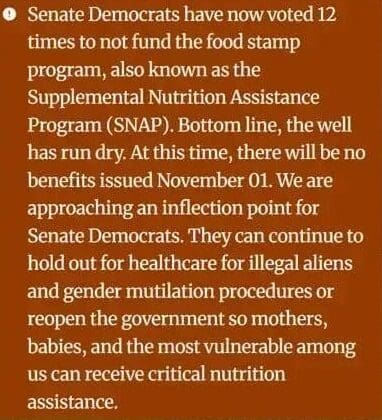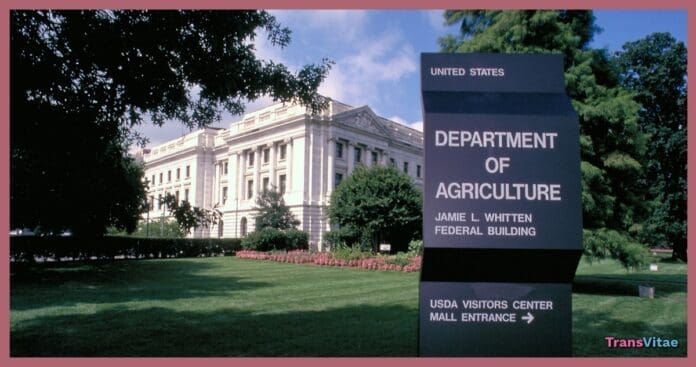The United States Department of Agriculture (USDA) announced that benefits under the Supplemental Nutrition Assistance Program (SNAP) will not be issued on November 1, citing the ongoing government funding stalemate and framing the halt as a consequence of Senate Democrats’ refusal to act.
On its official website, the USDA posted the message, “Senate Democrats have now voted 12 times to not fund the food stamp program, also known as the Supplemental Nutrition Assistance Program. Bottom line, the well has run dry.”
It further stated, “We are approaching an inflection point for Senate Democrats. They can continue to hold out for healthcare for illegal aliens and gender mutilation procedures or reopen the government so mothers, babies and the most vulnerable among us can receive critical nutrition assistance.”

This language has triggered sharp criticism from civil rights and legal experts. Advocates for transgender and immigrant communities view the wording as stigmatizing and misleading. By specifically naming “gender mutilation procedures” and undocumented immigrants as part of the reason for the SNAP benefits cutoff, the statement appears to cast already vulnerable populations as the cause of the crisis.
In Illinois, where approximately 1.9 million residents rely on SNAP, state officials sounded the alarm. Governor J.B. Pritzker issued a statement highlighting that “Families don’t deserve to go hungry because federal messaging became part of the problem instead of part of the solution.”
Legal scholars are also weighing in. One congressional oversight figure remarked, “This appears to be a political targeting of vulnerable groups through taxpayer-funded communication channels,” noting potential violations of the Hatch Act, which limits partisan or discriminatory government messaging.
Food security analysts emphasize the stakes: SNAP serves about one in eight Americans each month, making the potential pause in benefits extremely consequential. Critics say the real issue is the funding impasse, not the programs that assist marginalized people, yet the USDA’s message directs blame toward transgender individuals and immigrants instead of the budgetary gridlock.
Key Questions Now
Will Congress act to restore SNAP funding promptly? Will the USDA message face legal challenge for its tone or content? And how will states and local agencies respond if benefits lapse? This episode underscores how policy language can reinforce harm rather than mitigate it for trans and immigrant communities, who are already facing an elevated risk of economic instability and food insecurity.
The Bottom Line
The USDA’s public framing of the SNAP benefits cutoff isn’t simply poor taste, it strikes at the heart of how marginalized people are represented in policy crises. Monitoring how this unfolds will be important for advocates and anyone concerned with social equity and public-assistance transparency.


